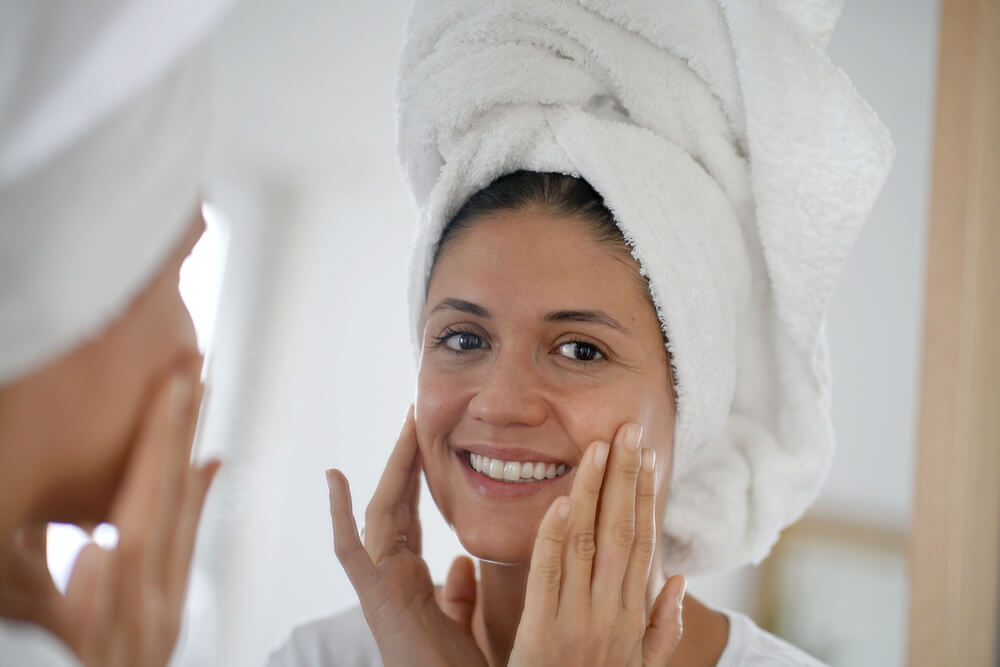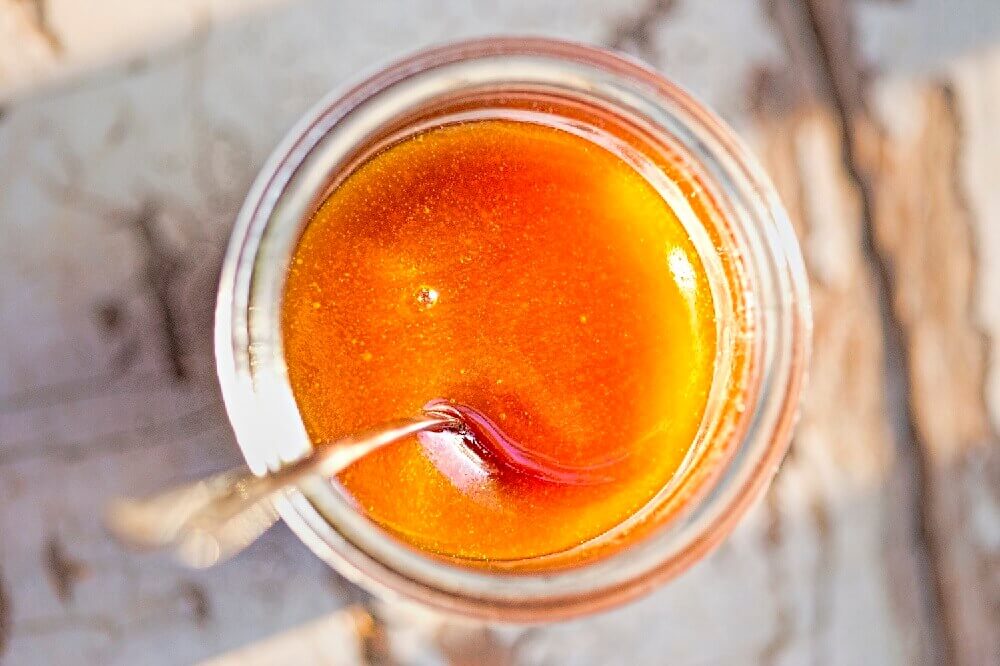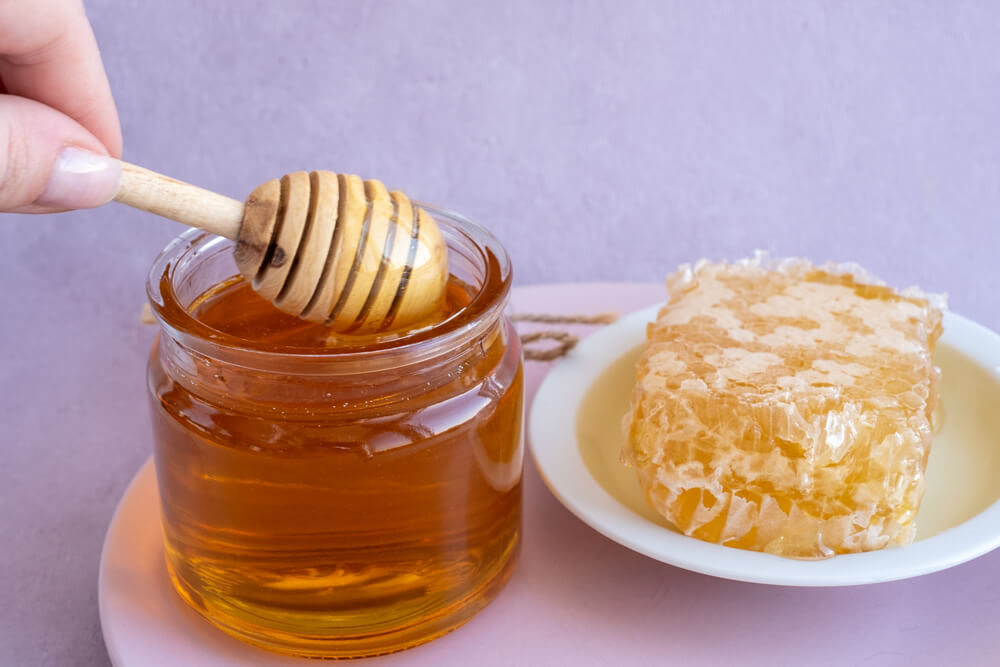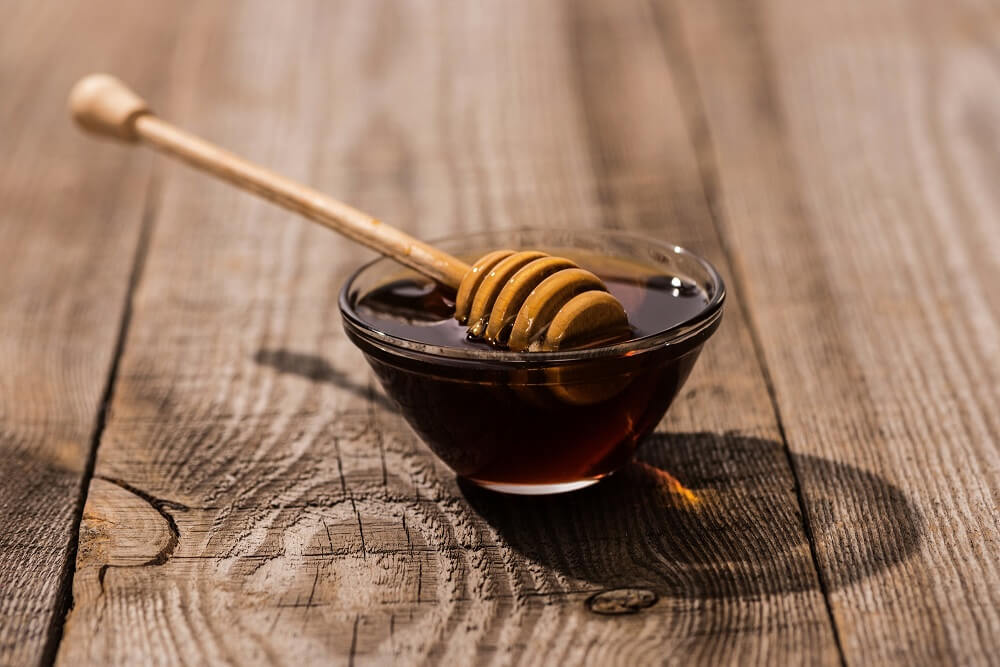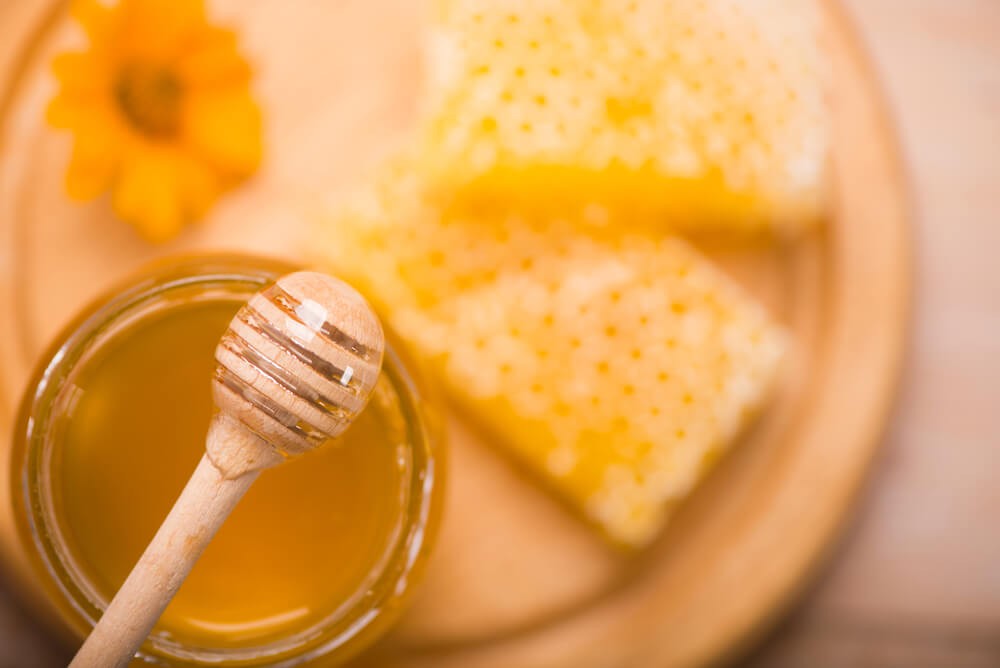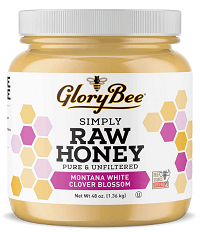Table of Contents:
Can I Apply Honey Directly on My Face?
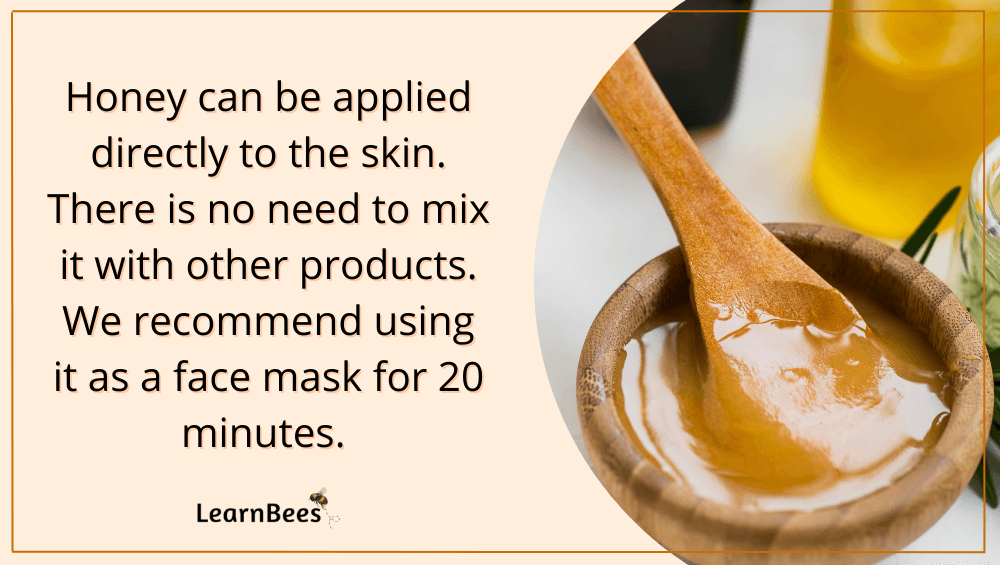
Raw honey can be applied directly to the face or body. Research shows that honey can be effective in treating skin conditions such as:
- Acne
- Eczema
- Psoriasis
- Cuts
- Burns
- Rashes
- Diabetic foot ulcers
Thanks to its antibacterial and anti-inflammatory effects, honey is becoming a popular ingredient in skincare products.
But it’s important to keep in mind:
Choose raw honey instead of processed honey. Processed honey is the kind you most commonly find at grocery stores.
You won’t reap any benefits if you use processed honey on your face. This is because overly processed honey is more like sugar syrup than it is real honey.
What’s worse?
Processed honey is heated to high temperatures and diluted with other ingredients. As such, it loses most of the antioxidants and other benefits that make honey good for the skin.(1)
This is why the FDA no longer considers overly processed honey to be real honey.(2)
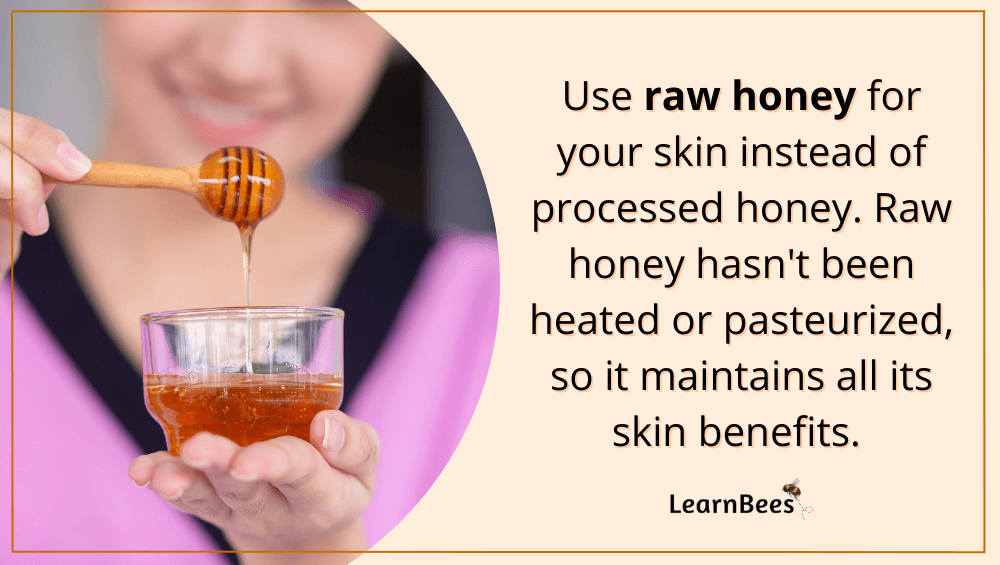
Raw honey is different.
Raw honey comes straight from the honeybee hive. It isn’t heated, diluted, or altered to change its composition. Instead, raw honey is left in its natural state just as the honeybees intended it.
When buying raw honey, ensure the label says “raw” and “unfiltered.”
With that in mind, the question becomes…
How do I apply honey to my face?
Start by applying raw honey directly to your skin. There is no need to dilute the honey with other ingredients because you want the raw honey to maintain its potency.
Avoid getting the honey too close to your hairline because it can be sticky. Allow the honey to sit on your face for 20 minutes, then gently wipe the honey off with a warm washcloth.
After that, you can apply your regular skincare products as usual.
Benefits of Honey For the Face
Now that we know how to apply honey to the face, let’s look at some of the benefits involved:
Benefit 1: Honey Can Help Heal Cuts, Burns, and Wounds
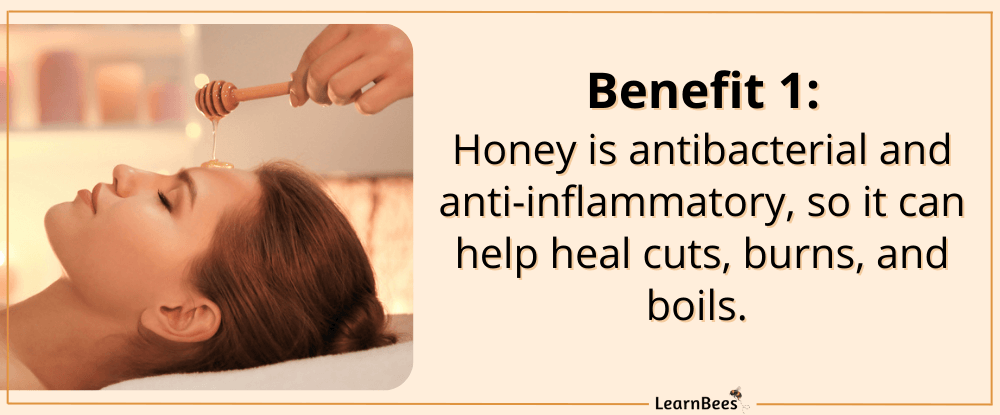
The usage of honey for skin dates back to ancient times. In fact, one honey usage document was recorded all the way back to 1392.(3)
A Cochrane Review examined all the evidence available to support using honey as a wound treatment. The study found strong evidence suggesting honey heals partial thickness burns around four to five days faster than other wound dressings.(4)
Evidence also suggests that honey is more effective than antiseptic and gauze for treating infected wounds after surgery.
Another study showed that honey has rapid diabetic wound-healing properties. In fact, honey was shown to have a 97% success rate in treating diabetic-related foot ulcers.(5, 6)
Benefit 2: Honey Can Help Reduce Acne Inflammation
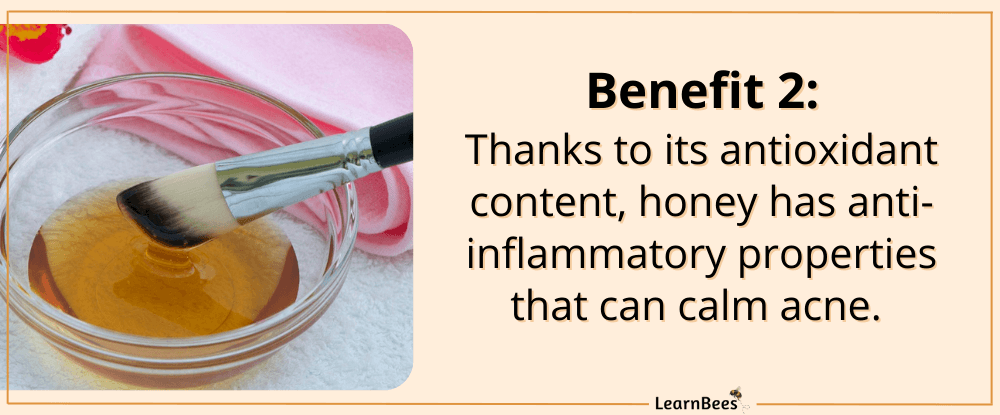
While honey isn’t the magical cure for treating acne, some evidence suggests it can soothe inflamed blemishes. This is thanks to honey’s antibacterial and calming properties.
One study found that honey from all over the world has antimicrobial properties.(7)
In another study, researchers found that medical-grade kanuka honey combined with 10% glycerine gave better results than using only antibacterial soap to treat acne.(8)
“Raw honey makes inflammatory acne look less angry because it has an osmotic effect on the skin—it can draw out [excess fluid] and help reduce inflammation,” says Kavita Mariwalla, a dermatologist in New York. “Honey can be a calming agent, so it also helps to reduce redness.”(9)
Benefit 3: Honey May Relieve Eczema Symptoms
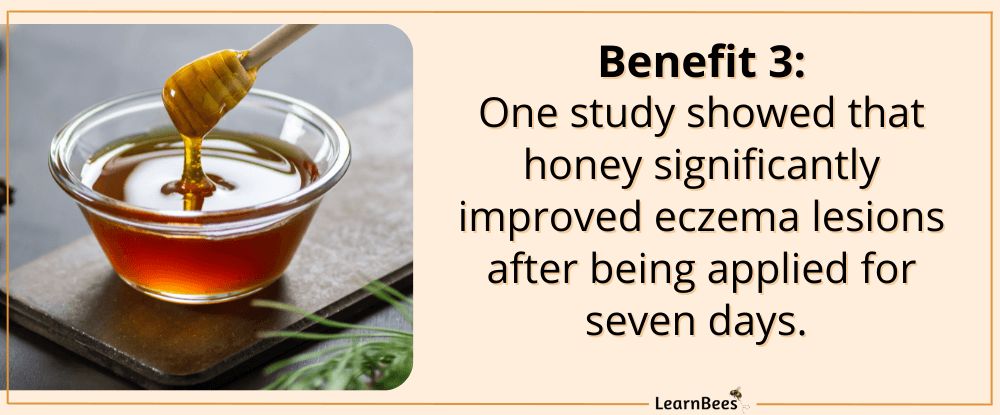
Eczema is a skin condition that leads to dry skin, itchiness, rashes, scaly patches, blisters, and skin infections. It’s common among children, but it can happen at any age.(10, 11)
Some research suggests that the medicinal properties of honey may help people with eczema.
For example, a small study found that eczema lesions notably improved after applying manuka honey for seven consecutive days.(12)
The researchers believe that honey’s antibacterial properties help counteract skin inflammation.
Additionally, another study shows that scientists worldwide have recognized honey for its therapeutic healing properties for the skin. Moreover, honey may promote tissue repair and balance the immune system.
The review suggests that honey may help treat atopic dermatitis and contact dermatitis. However, more research is needed to confirm these results.
Benefit 4: Honey May Reduce Psoriasis Lesions
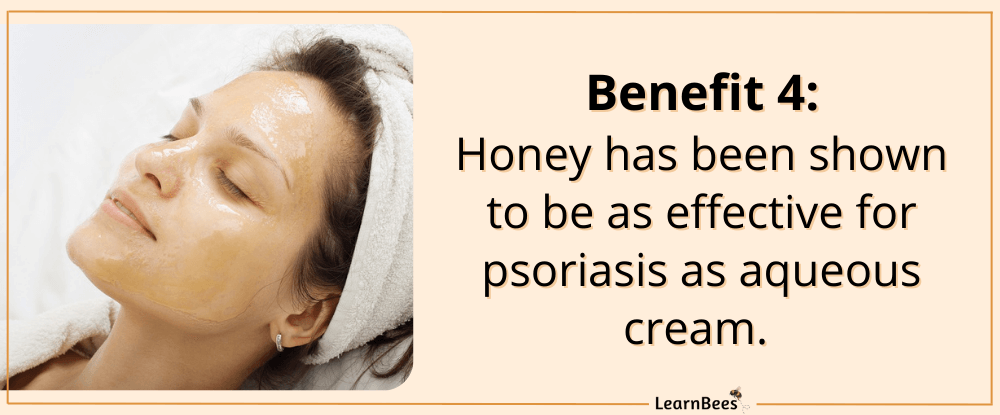
Psoriasis is an autoimmune disease that causes a rash with scaly, itchy patches, most commonly found on the scalp, face, knees, elbows, and lower back.(13, 14)
One study found that kanuka honey was as effective as aqueous cream in treating psoriasis lesions. Aqueous cream is one of the most widely prescribed emollients for treating dry skin conditions.(15)
Another study found similar results when they tested honey on a participant with mild psoriasis lesions.(16)
In both studies, the researchers believe that more extensive studies are required to prove honey’s effectiveness in treating psoriasis.
Risks of Honey for the Face
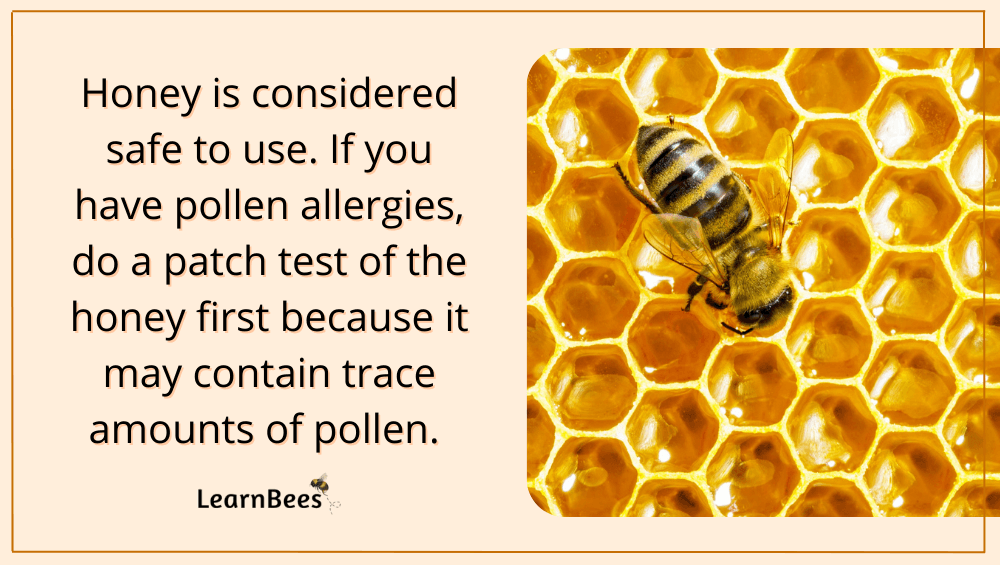
The good news is that honey poses very few risks to most people. However, be cautious of using honey for the face if you’re allergic to pollen.
Honey may contain small traces of pollen in it because honeybees collect pollen on their fuzzy bodies. As such, a few grains of pollen may get mixed in with the honey while the bees make it.
If unsure, we recommend doing patch testing on a small area of your face or body first.
Additionally, honey should not be used on the face or skin of babies under 12 months old. Babies may accidentally ingest the honey, which can lead to infant botulism.
This potentially fatal form of food poisoning occurs when a baby ingests bacteria that produce toxins in their intestines. While it’s rare, this type of food poisoning can be dangerous for babies because they have immature digestive systems.
FAQs on Honey for the Face
- Can I apply honey directly on my face?
- Can I apply honey to my face every day?
- What can I mix with honey for my face?
- What are the benefits of putting honey on your face?
- Can honey remove dark spots?
- Does honey lighten skin?
- How long should honey stay on your face?
- Does honey reduce wrinkles?
- How do you wash your face after using honey?
- Can I leave honey on my face overnight?
- Does honey make your face glow?
- Does honey make you look younger?
- Can honey remove pimples?
- Can I mix honey with my face cream?
- Which honey is best for anti-aging?
- Can honey be applied under the eyes?
- What can I mix with honey for dark circles?
- What are the side effects of applying honey on the face?
- Can honey treat blackheads?
Can I apply honey directly on my face?
Yes, honey can be applied directly to the face. It can be sticky, so keep it away from your hairline.
—> Go back to the FAQs on honey for the face
More to Explore:
Can I apply honey to my face every day?
Yes, you can use honey on your face every day. You can use it either morning or night, leaving it on for 20 minutes before wiping it off gently with a warm washcloth.
—> Go back to the FAQs on honey for the face
More to Explore:
- Honey Pasteurization: Does it Ruin Raw Honey?
- Honey for Skin Benefits: Directions, Uses, & Risks
- 8 Scientific Benefits of Raw Honey
What can I mix with honey for my face?
Honey can be mixed with a moisturizer. However, we recommend using raw honey directly on your face without diluting it. Use it as a face mask for 20 minutes, then remove it. There is no need to dilute the honey or reduce its potency.
—> Go back to the FAQs on honey for the face
More to Explore:
What are the benefits of putting honey on your face?
Honey is not an end-all-be-all skin care cure. That said, honey does show promising results for treating inflammation and healing wounds. Also, honey is a natural humectant that helps skin retain moisture.(17)
—> Go back to the FAQs on honey for the face
More to Explore:
Can honey remove dark spots?
There is only anecdotal evidence that honey can help lighten dark spots on the skin. Proper research must confirm if honey is a suitable dark spot treatment. In the meantime, seeking treatment from a board-certified dermatologist is your best option for dark spots.
—> Go back to the FAQs on honey for the face
More to Explore:
Does honey lighten skin?
No, despite some online claims, honey will not lighten your skin.
—> Go back to the FAQs on honey for the face
More to Explore:
How long should honey stay on your face?
Leave the honey on your skin for at least 20 minutes for maximum benefits.
—> Go back to the FAQs on honey for the face
More to Explore:
Does honey reduce wrinkles?
People are often curious about anti-aging home remedies with honey for the face. Unfortunately, honey doesn’t help reduce wrinkles. It may help the skin appear more moisturized and rejuvenated temporarily, but honey will not smooth the wrinkles itself.
Wrinkles can be treated with the help of dermatologists. Dermatologists often prescribe anti-aging topicals such as Tretinoin (Retin-A) or offer treatments such as skin lasers and deep-level chemical peels. Please consult your dermatologist for more information.
—> Go back to the FAQs on honey for the face
More to Explore:
- The Top 3 Best Manuka Honey Brands
- Orange Blossom Honey: Uses, Benefits, & Risks
- Sourwood Honey: Uses, Benefits, & Risks
How do you wash your face after using honey?
Gently wipe the honey off your skin using a warm washcloth. Then, wash with your regular face cleanser to remove any additional residue.
—> Go back to the FAQs on honey for the face
More to Explore:
- How to Make Beeswax Lip Balm
- Beeswax vs. Soy Wax: Which is Better for Candle Making?
- How is Honey Useful?
Can I leave honey on my face overnight?
Yes, you can leave honey on your face overnight, but it may result in a sticky residue that’s hard to sleep in. As a result, we recommend simply using honey as a 20-minute face mask.
—> Go back to the FAQs on honey for the face
More to Explore:
Does honey make your face glow?
People often ask, “How can I use honey for glowing skin?”
Honey can make your face glow by reducing inflammation. Also, honey is a natural humectant that helps skin retain moisture.
—> Go back to the FAQs on honey for the face
More to Explore:
Does honey make you look younger?
People often ask if they can use home remedies with honey for the face.
While honey can help reduce inflammation and moisturize the skin, it’s not an anti-aging treatment. For wrinkles and fine lines, please consult your dermatologist.
—> Go back to the FAQs on honey for the face
Can honey remove pimples?
Honey can help reduce the size of a pimple by soothing the inflammation. This is why many people use honey as a face mask treatment for acne-prone skin. However, honey will not help prevent acne from forming in the first place.
—> Go back to the FAQs on honey for the face
Can I mix honey with my face cream?
Yes, honey can be mixed with face cream. We recommend mixing 1/2 teaspoon honey with 1/2 teaspoon face cream to test it first. You may need to experiment with the ratios to find a consistency you like. Remember, honey is very sticky, so use it in moderation if you mix it with other ingredients.
—> Go back to the FAQs on honey for the face
Which honey is best for anti-aging? What’s the best honey for the face?
Always choose raw honey over processed honey. The label should say “raw” and “unfiltered” on it. Also, remember that honey isn’t a miracle cure for aging. It’s best used to treat wounds, inflammation, and skin conditions like eczema.
—> Go back to the FAQs on honey for the face
Can honey be applied under the eyes?
Yes, honey can be applied under the eyes.
—> Go back to the FAQs on honey for the face
What can I mix with honey for dark circles?
People often ask if there are dark circle home remedies with honey for the face.
Our recommendation is to see a dermatologist for the treatment of dark circles. No evidence currently suggests that honey is effective in treating dark circles.
—> Go back to the FAQs on honey for the face
What are the side effects of applying honey on the face?
There are no known side effects of applying honey to the face. However, people with pollen allergies should do a patch test first because honey may contain tiny traces of pollen.
—> Go back to the FAQs on honey for the face
Can honey treat blackheads?
Honey is not the best option for treating blackheads because it doesn’t cleanse the pore or remove dirt. Instead, honey is antimicrobial and has antioxidants that can reduce inflammation.
